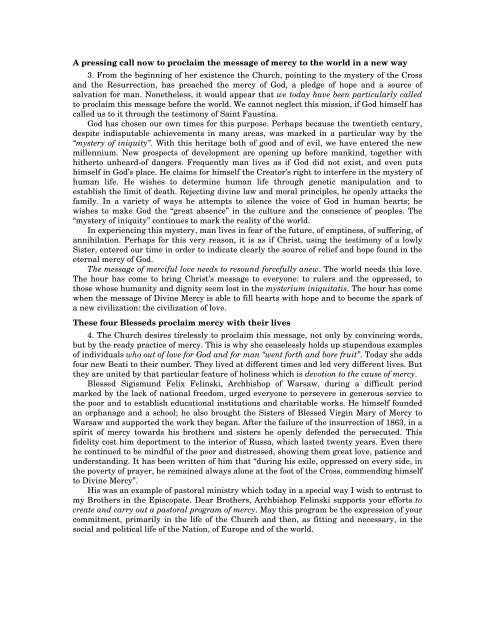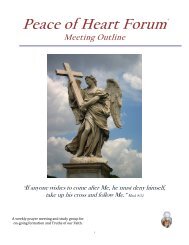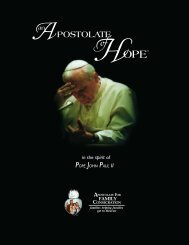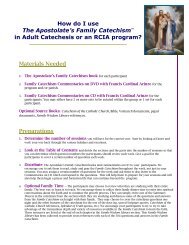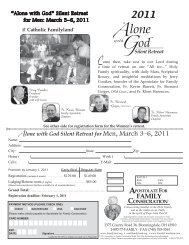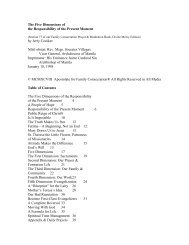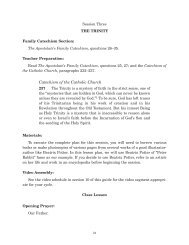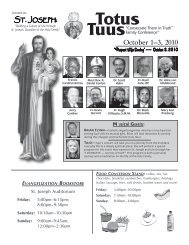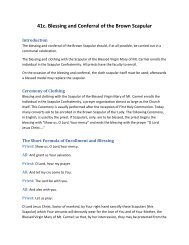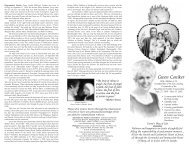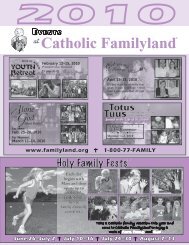20a. - 20k. Divine Mercy Section - Apostolate for Family Consecration
20a. - 20k. Divine Mercy Section - Apostolate for Family Consecration
20a. - 20k. Divine Mercy Section - Apostolate for Family Consecration
You also want an ePaper? Increase the reach of your titles
YUMPU automatically turns print PDFs into web optimized ePapers that Google loves.
A pressing call now to proclaim the message of mercy to the world in a new way<br />
3. From the beginning of her existence the Church, pointing to the mystery of the Cross<br />
and the Resurrection, has preached the mercy of God, a pledge of hope and a source of<br />
salvation <strong>for</strong> man. Nonetheless, it would appear that we today have been particularly called<br />
to proclaim this message be<strong>for</strong>e the world. We cannot neglect this mission, if God himself has<br />
called us to it through the testimony of Saint Faustina.<br />
God has chosen our own times <strong>for</strong> this purpose. Perhaps because the twentieth century,<br />
despite indisputable achievements in many areas, was marked in a particular way by the<br />
“mystery of iniquity”. With this heritage both of good and of evil, we have entered the new<br />
millennium. New prospects of development are opening up be<strong>for</strong>e mankind, together with<br />
hitherto unheard-of dangers. Frequently man lives as if God did not exist, and even puts<br />
himself in God’s place. He claims <strong>for</strong> himself the Creator’s right to interfere in the mystery of<br />
human life. He wishes to determine human life through genetic manipulation and to<br />
establish the limit of death. Rejecting divine law and moral principles, he openly attacks the<br />
family. In a variety of ways he attempts to silence the voice of God in human hearts; he<br />
wishes to make God the “great absence” in the culture and the conscience of peoples. The<br />
“mystery of iniquity” continues to mark the reality of the world.<br />
In experiencing this mystery, man lives in fear of the future, of emptiness, of suffering, of<br />
annihilation. Perhaps <strong>for</strong> this very reason, it is as if Christ, using the testimony of a lowly<br />
Sister, entered our time in order to indicate clearly the source of relief and hope found in the<br />
eternal mercy of God.<br />
The message of merciful love needs to resound <strong>for</strong>cefully anew. The world needs this love.<br />
The hour has come to bring Christ’s message to everyone: to rulers and the oppressed, to<br />
those whose humanity and dignity seem lost in the mysterium iniquitatis. The hour has come<br />
when the message of <strong>Divine</strong> <strong>Mercy</strong> is able to fill hearts with hope and to become the spark of<br />
a new civilization: the civilization of love.<br />
These four Blesseds proclaim mercy with their lives<br />
4. The Church desires tirelessly to proclaim this message, not only by convincing words,<br />
but by the ready practice of mercy. This is why she ceaselessly holds up stupendous examples<br />
of individuals who out of love <strong>for</strong> God and <strong>for</strong> man “went <strong>for</strong>th and bore fruit”. Today she adds<br />
four new Beati to their number. They lived at different times and led very different lives. But<br />
they are united by that particular feature of holiness which is devotion to the cause of mercy.<br />
Blessed Sigismund Felix Felinski, Archbishop of Warsaw, during a difficult period<br />
marked by the lack of national freedom, urged everyone to persevere in generous service to<br />
the poor and to establish educational institutions and charitable works. He himself founded<br />
an orphanage and a school; he also brought the Sisters of Blessed Virgin Mary of <strong>Mercy</strong> to<br />
Warsaw and supported the work they began. After the failure of the insurrection of 1863, in a<br />
spirit of mercy towards his brothers and sisters he openly defended the persecuted. This<br />
fidelity cost him deportment to the interior of Russa, which lasted twenty years. Even there<br />
he continued to be mindful of the poor and distressed, showing them great love, patience and<br />
understanding. It has been written of him that “during his exile, oppressed on every side, in<br />
the poverty of prayer, he remained always alone at the foot of the Cross, commending himself<br />
to <strong>Divine</strong> <strong>Mercy</strong>”.<br />
His was an example of pastoral ministry which today in a special way I wish to entrust to<br />
my Brothers in the Episcopate. Dear Brothers, Archbishop Felinski supports your ef<strong>for</strong>ts to<br />
create and carry out a pastoral program of mercy. May this program be the expression of your<br />
commitment, primarily in the life of the Church and then, as fitting and necessary, in the<br />
social and political life of the Nation, of Europe and of the world.


